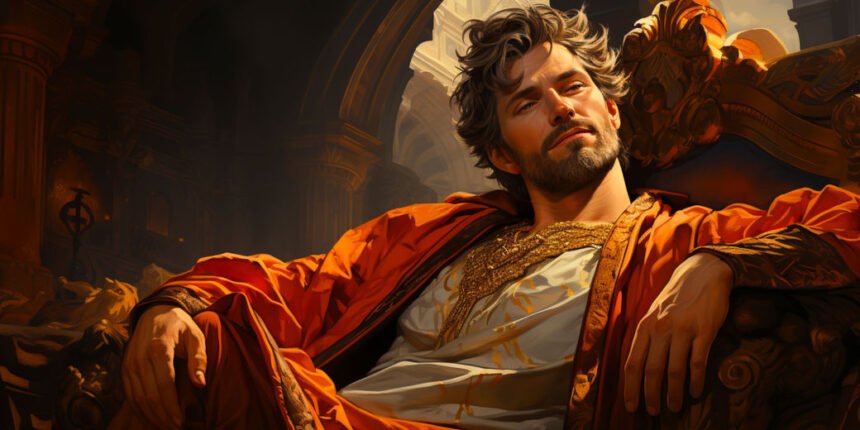Introduction to Ancient Rome and Emperor
Ancient Rome—a civilization that continues to captivate our imaginations. From grand amphitheaters and intricate mosaics to the powerful emperor who ruled with an iron fist, this era was nothing short of extraordinary. But what does it truly take to become an emperor in a world where ambition and strategy reign supreme?
Imagine donning a laurel wreath, standing before legions of loyal soldiers, and making decisions that would shape the course of history. Becoming an emperor isn’t just about having royal blood; it’s a complex journey filled with challenges, alliances, and leadership skills. Whether you’re intrigued by history or dreaming of conquering your own empire someday (in your backyard or otherwise), this essential guide will walk you through the steps required to ascend to one of the most coveted positions in ancient society.
Ready to step into the sandals of power? Let’s embark on this fascinating journey together!
Research and Study the Lives of Past Emperor
To become an emperor, one must first immerse themselves in the rich tapestry of ancient Roman history. The lives of past emperor offer invaluable lessons and insights.
Explore their triumphs and failures. Figures like Augustus set the stage for a golden age, while Nero’s reign serves as a cautionary tale. Each story reveals strategies, decisions, and consequences that shaped Rome.
Delve into primary sources such as biographies and historical texts. Works by Tacitus or Suetonius provide vivid accounts of personalities behind the title. Understanding their motivations helps you grasp what it truly means to rule.
Don’t overlook regional histories either; they often highlight local power struggles affecting imperial authority.
By studying these legacies meticulously, aspiring leaders can draw parallels with modern governance challenges—an essential step toward claiming the coveted title of emperor in your own right!
Learn Latin and Other Important Skills
To navigate the political landscape of Ancient Rome, mastering Latin is essential. This language was not just a means of communication but also a symbol of power and culture.
Understanding Latin opens doors to ancient texts, speeches, and philosophies that shaped the empire. It allows you to engage with historical documents like never before.
Beyond language skills, consider studying law and rhetoric. Knowledge in these areas will enhance your ability to persuade others—a key trait for any aspiring emperor.
Familiarize yourself with Roman history, military strategy, and governance practices as well. These subjects provide insights into effective leadership.
Engaging in public speaking can further refine your abilities. The emperors often addressed crowds; being articulate can win hearts and minds alike.
Each skill adds another layer to your persona as a leader prepared for the complexities of ruling an empire.
Understand the Political and Social Climate of Ancient Rome
To become an emperor in ancient Rome, grasping the political and social climate is essential. The intricate web of power dynamics shaped every decision made within the senate and among the populace.
Political factions like the Optimates and Populares played pivotal roles in governance. Understanding their ideologies can aid your rise to influence. Alliances were often forged through marriage or loyalty, impacting both personal relationships and public perception.
Social status also influenced authority. Patricians held significant sway, while plebeians could rally support for reforms or changes. Knowing how to navigate these classes was key to gaining favor.
Public opinion mattered immensely; emperors relied on popular support as much as military strength. Engaging with citizens at forums or games solidified a ruler’s image.
Being aware of these factors will arm you with insights necessary for strategic maneuvering within this vibrant but volatile society.
Develop Leadership Skills
To become an emperor, developing leadership skills is paramount. Leadership in ancient Rome required a unique blend of charisma, decisiveness, and the ability to inspire loyalty among both soldiers and citizens.
Begin by studying great leaders from history. Analyze their triumphs and failures. Understand what made them effective or led to their downfall. This will provide valuable insights into your own approach.
Practice public speaking and rhetoric. The ability to communicate clearly can rally support for your ideas. Consider joining groups or clubs that encourage debate and discussion; these platforms are perfect for building confidence.
Immerse yourself in team activities too. Whether it’s organizing events or leading projects, real-life experience is invaluable. Surround yourself with mentors who embody strong leadership qualities; learn from their experiences.
Embrace challenges as opportunities for growth. Each setback provides lessons about resilience and adaptability—key traits for any aspiring emperor.
Gain Military Experience
To become an emperor, military experience is crucial. The Roman Empire thrived on its formidable army. Understanding warfare and strategy gives you a significant edge.
Start by enlisting in the legions or seeking roles within high-ranking commanders’ staffs. Participation in campaigns allows firsthand knowledge of tactics, logistics, and leadership under pressure.
Learn discipline through rigorous training exercises. Leadership isn’t just about commanding troops; it’s also about inspiring loyalty and camaraderie among soldiers.
Study famous battles from history books to gain insights into successful strategies employed by past generals. Analyze what worked and what didn’t to refine your approach.
Attend military drills regularly to maintain physical fitness as well as tactical sharpness.
Connecting with experienced veterans can provide mentorship opportunities that are invaluable for your growth in this domain. These relationships might open doors to promotions or strategic alliances down the road, paving your path toward imperial greatness.
Form Connections and Network with Influential People
Building a network in ancient Rome was crucial for anyone aspiring to become an emperor. Connections could make or break your journey to power.
Start by mingling with senators, military leaders, and wealthy patricians. Attend social gatherings, banquets, and public events where influential figures gather. Be seen and heard; presence matters.
Engage in conversations that showcase your knowledge of politics and culture. Show interest in their ideas while subtly promoting your ambitions.
Form alliances through marriages or partnerships that align you with powerful families. Loyalty often comes from blood ties.
Also, consider patronage as a tool for networking. Offer support to those on the rise; they might return the favor when you’re seeking power.
Keep ear to the ground about emerging trends and political shifts—this knowledge allows you to position yourself advantageously among key players in Roman society.
Rise to Power: Tips for Becoming an Emperor
To rise to the prestigious position of an emperor, you need a blend of strategy and charisma. Start by securing the loyalty of key military leaders. A strong army is essential for maintaining power in ancient Rome.
Next, cultivate relationships with influential senators. Gaining their support can provide legitimacy and stability to your rule. Attend public events, engage in political discussions, and showcase your commitment to Roman values.
Don’t underestimate the importance of public favor. Host games or festivals that entertain citizens while demonstrating your generosity as a leader.
Additionally, be prepared to eliminate rivals discreetly but effectively. Political intrigue often defines leadership in this era.
Don’t shy away from showcasing accomplishments—whether military victories or infrastructure projects—to solidify your reputation as a capable ruler among both elite circles and everyday Romans alike.
Challenges Faced by Ancient Roman Emperors
The path to becoming an emperor in Ancient Rome was fraught with challenges. Political intrigue loomed around every corner, often leading to betrayals and assassination plots. One moment you could be hailed as a leader; the next, you might find yourself at the mercy of a conspiracy.
Managing an empire that spanned continents also posed significant difficulties. Emperors had to deal with diverse cultures and languages while ensuring loyalty from their subjects. This required not only political acumen but also cultural sensitivity.
Military conflicts were another pressing concern. Campaigns against rival factions or foreign invaders meant constant pressure on resources and manpower. An emperor’s military success often determined their popularity and longevity in power.
Furthermore, public opinion played a vital role in governance. The whims of the Roman populace could shift quickly, requiring emperors to navigate fluctuating sentiments carefully. Keeping both the elite satisfied while addressing common citizens’ needs proved no easy task either.
Conclusion: The Legacy of Ancient Roman
The legacy of ancient Roman emperors is a tapestry woven with ambition, power struggles, and remarkable achievements. Their influence shaped not just Rome but the entire Western world.
Architecture, law, and governance transformed under their rule. The structures they built still stand as testaments to their vision. Think of the Colosseum or aqueducts that changed urban living forever.
Culturally, emperors like Augustus fostered art and literature that continue to inspire today’s creators. Their stories reflect human aspirations—both noble and flawed.
The political lessons learned from their reigns remain relevant in modern leadership discussions. Understanding how these rulers navigated crises can provide insights into current governance challenges.
Ancient Roman emperors left an indelible mark on history. They remind us of the complexities inherent in power and the enduring impact one individual can have on civilization’s trajectory.
FAQs
The legacy of ancient Roman emperors is rich and multifaceted. These rulers shaped not only the course of Rome but also influenced governance for centuries to come. Their stories are filled with triumph, tragedy, ambition, and power struggles that continue to capture our imagination today.
If you’re curious about taking on the mantle of an emperor or simply want to learn more about their fascinating history, here are some frequently asked questions:
Q: What qualities did successful Roman emperors possess?
A: Successful emperors often displayed strong leadership skills, charisma, military prowess, and political savvy. They were adept at navigating complex social dynamics and maintaining loyalty among their followers.
Q: Was there a specific path one had to follow to become an emperor?
A: While there was no formal pathway, many emperors emerged from military ranks or held significant political positions such as consul before ascending to the throne.
Q: How important was military experience for becoming an emperor?
A: Military experience played a crucial role in gaining respect and support from both troops and citizens alike. Many emperors rose through the ranks due to their battlefield achievements.
Q: Did all Roman emperors have similar ruling styles?
A: Not at all! Each emperor had his unique style based on personality traits, challenges faced during reigns, and individual philosophies regarding governance.
Q: What were some common challenges faced by Roman emperors?
A: Challenges included managing vast territories, dealing with internal strife (like uprisings), threats from rival factions or external enemies (such as invading tribes), economic instability, and succession crises.
Q: Can anyone aspire to be like an ancient Roman emperor today?
A: While it’s unlikely someone can literally become an emperor in modern times due to different societal structures now in place—understanding leadership principles can still serve valuable lessons across various fields today.
Whether you dream of wearing a laurel crown in your mind’s eye or simply wish to delve deeper into this remarkable epoch of history—the essence of being a ruler remains timelessly captivating.








